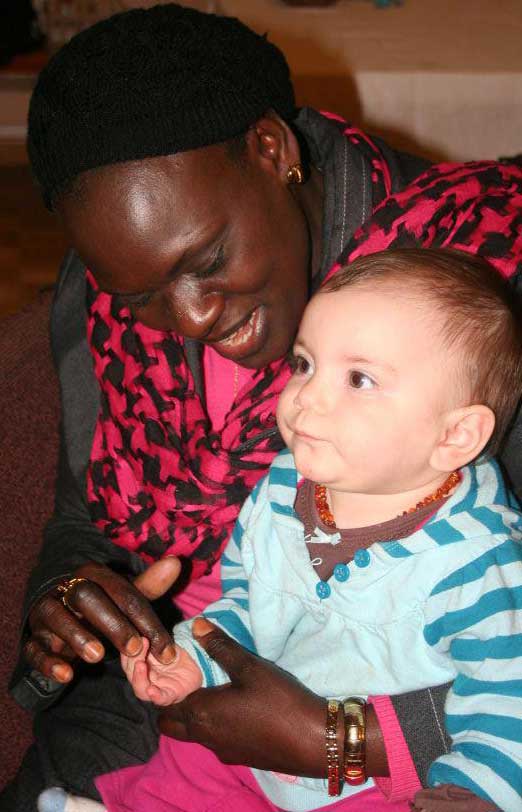April 19. 2020
Music gives a soul to the universe, wings to the mind, flight to the imagination, and life to everything. – Plato

Human Interaction and the Value of Finger Plays
by Jerilyn Burke
In my work with children, my greatest pleasure is sharing the joy of music, whether it is with song, an instrument such as the kinderharp, or the musicality of a spoken verse. It is a kind of communication that runs deeper than the actual words spoken, conveying love and intent by tone, gesture and expression. How important it is for the young child, whose vocabulary is still evolving to have the intention of your thoughts more clearly revealed through music. Children are eager learners and comprehend more than we realize.
And what a gift it is for children to experience live music! A true physical interaction of sound resonates through the senses when one experiences the voice of another or the reverberations of an instrument. Nothing can replace the nourishing experience of a caregiver’s lullaby. Even if you think you cannot sing, your underlying intention and effort is the beauty that is perceived. Sally Goddard Blythe, author of The Genius of Natural Childhood and director of the Institute for Neuro-Physiological Psychology in England, has concluded, “children’s response to live music is different from recorded music. Babies are particularly responsive when the music comes directly from the parent. It is the human interaction which is important.”[1]
Finger Plays and Gesture Games: Supporting the Child’s Sense of Self and Environment
“What the child imitates,” says Froebel, “he begins to understand. Let him represent the flying of birds and he enters partially into the life of birds. Let him imitate the rapid motion of fishes in the water and his sympathy with fishes is quickened. Let him reproduce the activities of a farmer, miller, and baker, and his eyes open to the meaning of their work. In one word let him reflect in his play the varied aspects of life and his thought will begin to grapple with their significance.” – Friedrich Froebel
So begins the preface for Emilie Poulsson’s Finger Plays for Nursery and Kindergarten, a charming handbook for parents & teachers first published in 1893.[2] It seems that Poulsson was greatly influenced by this quote. Friedrich Froebel was a German pedagogue and creator of the “kindergarten” concept and his great insight was to recognize the importance of playful activity in children’s learning.[3] Over a hundred years has passed since this idea emerged and science has come to back it up. As children imitate such movements as a bird flying or the hammering of a cobbler through a finger play rhyme or story, they not only develop dexterity and coordination, but also their understanding & conceptual sense of the subject and of themselves. What a wonderful way to learn about the world!
There is also a therapeutic aspect to finger plays. In those moments of true presence, when you take hold of a baby’s little foot and gently play This Little Piggy, there is an experience of joyful love that occurs, physically and emotionally. How helpful it can be, when a child seems out of sorts, to be with them, one on one, and do a sweet gesture game such as Ten Little Raindrops, ending with a reassuring embrace.
There is a loving playfulness to these kinds of interactions that warms both the giver and receiver. In the preface for Wilma Ellersiek’s Giving Love-Bringing Joy handbook of gesture games, Dr. Jürgen and Irmela Möller write “Grown-ups [the giver] also undergo a change when we practice the touch games. We achieve inner peace and concentration when we unite our entire ego-awareness with the movements. When the games are carried out with care, warmth and love stream through our arms and hands.”[4] The receiver takes this in. And as it so happens, these kinds of gestures have shown to benefit the brain. Researchers in the UK found that receiving loving touch, characterized by a slow caress and gentle stroking, increases the brain’s ability to construct a sense of body ownership and plays a big part in creating and sustaining a healthy sense of self. [5]
The Möllers go on to advise that touch games “need to be done lovingly, cheerfully and gently, being aware of the small child’s needs and patiently entering with senses open to the reaction of the child.” These types of games should never be stressful for the child. It has been my experience, that when consciously approached, children will ask for these games again and again. In addition to the cheerful nature of these rhymes, one of the things that children enjoy is your warm attention. You are not thinking about making dinner, you are not thinking about emails. Magda Gerber, an early childhood educator who championed the concept of respect for the infant as a complete human being, explains that “when you hold an infant, hold him not just with your body, but with your mind and heart.”[6] What good advice to strive for with interactions of all kinds! Gerber is passionate about encouraging parents to fully engage when nurturing, such as when you change diapers or wipe faces, perhaps even adding a little game for giggles. There are opportunities for this kind of presences throughout the day for older children as well – seize them. You may find that when you give your children this full awareness, if only for a moment, they will feel nourished and be content to move on t their own work of self-directed discovery.
The video below features Jaimmie Stugard, director of LifeWays Early Childhood Center in Milwaukee, WI and her daughter:
Ten little raindrops dancing on the walk
Pitter patter, pitter patter that’s the way they talk
(Begin with child’s back to you with a reassuring inner gesture, fingertips lightly pitter pattering on their back)
Then comes a gust of wind blowing through the sky
(Gently blow on each side of your child’s head)
And away the raindrops fly… fly… .fly…
(Move your hands gently down the outside of child’s arms from top to bottom; Move hands under child’s arms and make flying motion and end by wrapping the child’s and your arms around their body in a warm embrace.)
Here are some FREE downloads on Online Waldorf Library (OWL) for you to use:
Dancing Hand, Trotting Pony by Wilma Ellersiek https://www.waldorflibrary.org/books/3/view_bl/52/ebooks/793/dancing-hand-trotting-pony-ebook
Merrily We Sing by Ilian Willwerth https://www.waldorflibrary.org/books/3/view_bl/56/preschool/297/merrily-we-sing-ebook
*Please note: you must refresh your screen between downloading eBooks on OWL.
[1] Goddard Blythe, Sally. “The Genius of Natural Childhood: Secrets of Thriving Children.” The Genius of Natural Childhood: Secrets of Thriving Children by Sally Goddard Blythe. Hawthorne Press, 1 July 2011. Web. 29 Aug. 2014.
[2] Poulsson, Emilie. Finger Plays for Nursery and Kindergarten. New York: Dover, 1971. Print.
[3] “Friedrich Frobel.” Wikipedia. Wikimedia Foundation, 17 Sept. 2014. Web. 04 Sept. 2014.
[4] Möller, Jürgen, Dr., and Irmela Möller. “Foreward to the German Edition.” Giving Love – Bringing Joy. By Wilma Ellersiek. Spring Valley: WECAN, 2003. 9-12. Print.
[5] Bergland, Christopher. “Loving Touch is Key to Healthy Brain Development.” Psychology Today. Sussex Digital, 9 Oct. 2013. Web. 29 Aug. 2014.
[6] “Magda Gerber, Seeing Babies with New Eyes.” Magda Gerber. N.p., n.d. Web. 29 Aug. 2014.

Love this video! Can’t wait to share it with my two children coming today!
Thank you so much for sharing it!
Warmly,
Sara
Fabulously expressed! I am so pleased you brought this content forward. The power of touch is so therapeutically transformative. I have seen it in action through my work but most explicitly in my (class) children with sensory issues, anxiety and PTSD. The trust built up through loving touch saves them from a life of trauma. It really does.